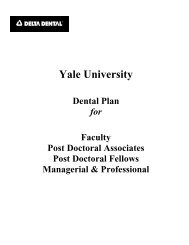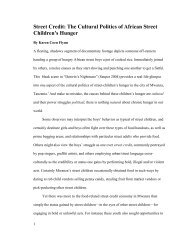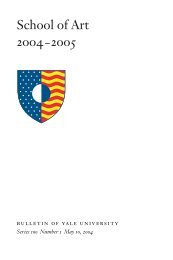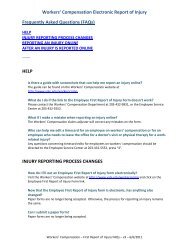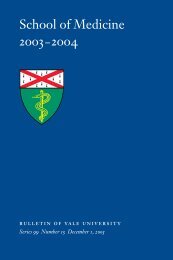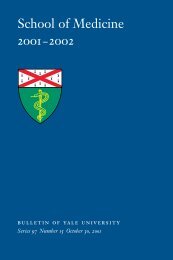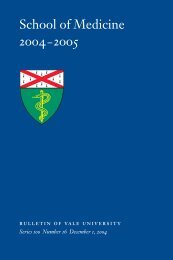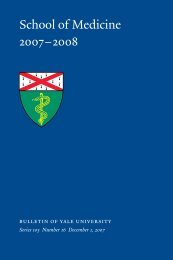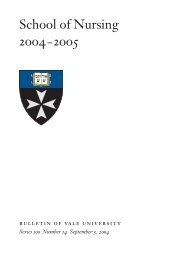bulletin 2002/nursing/pages.7 - Yale University
bulletin 2002/nursing/pages.7 - Yale University
bulletin 2002/nursing/pages.7 - Yale University
- No tags were found...
You also want an ePaper? Increase the reach of your titles
YUMPU automatically turns print PDFs into web optimized ePapers that Google loves.
104 School of Nursing769a, Advanced Concepts and Principles of Diabetes Care. 2 credit hours. This seminarfocuses on the concepts and principles of diabetes managed care based on the AmericanDiabetes Association Standards of Care (<strong>2002</strong>). It includes principles of primary care(screening, early detection, intervention, patient education), secondary care principlesrelated to diabetes management, tertiary care related to complications, various treatmentmodalities, patient education, and self-care. These concepts and principles of care arepresented relative to type of diabetes (insulin dependent, noninsulin dependent, gestationaland pregnancy, and secondary), age, developmental stage, duration of disease, andethnicity. A multidisciplinary approach to care issues is emphasized, incorporatingthe contributions of other disciplines in the collaborative management of diabetes.Important aspects of living with a chronic illness such as the psychologicial, social, occupational,and economic are also emphasized. Required in the final year of study for allstudents in the Diabetes Care concentration. Open to others with permission of theinstructor. Two hours per week. G. Melkus, coordinator.775a, Health Care of Women and Infants: Public Policy and Programs. 2 credithours. This course is designed to provide students with a working knowledge of Title Vand other federal programs that affect the health care of women and infants. The conceptof public responsibility for maternal and child health and its expression in publicprograms implemented earlier in this century are discussed. The current legislative basefor the health care of women and infants is identified and examples of the delivery of serviceson the local and state levels (planning, financing, implementation, coordination,and evaluation) are discussed to illustrate the actual implementation of public policy.The role of the health care practitioner as a leader and/or as a member of an interdisciplinaryteam is emphasized throughout. Current trends in health care economics andprograms on the local, state, and national levels are described, and their impact on thehealth status of women and infants explored. Required for all students in the Nurse-Midwiferyspecialty in the final year of specialization. Open to others with permission of theinstructor. Two hours per week. L. Ament.78oa, Primary Care of Women: Intrapartum, Postpartum, and Newborn Care. 6.0credit hours. Students continue clinical experience in intrapartum and postpartum areas,extending their abilities through lectures, seminars, and study to provide care in morecomplicated clinical situations. All students are required to become certified in neonatalresuscitation through the American Academy of Pediatrics course. Required for allnurse-midwifery students in the final year of specialization. M. E. Bouchard, T. Clark.78ob, Integration. 9 credit hours. This course is a clinical preceptorship in nursemidwifery.Students are assigned to a clinical preceptor for clinical experience in all areasof nurse-midwifery practice. This module is designed to pull together all areas of nursemidwiferypractice to enable students to experience full-scope care through a blendingof all previous program objectives and skills. The goal is for the student to be a safe, competentbeginning-level practitioner at the end of the module. Seminars are designed toaugment the transitional role from student to nurse-midwife. Required for all nursemidwiferystudents in the final year of specialization. L. Ament.




